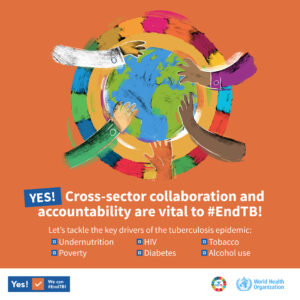The 24th March is World Tuberculosis Day, it was this day in 1882 that the bacterium that causes tuberculosis (TB) was discovered. The theme for this year is ‘Yes! We can end TB!’ Imagine a world where one of the oldest and deadliest diseases, responsible for claiming millions of lives, is finally eradicated. A world where TB is no longer a threat. Through collaboration and the involvement of high-level leadership this could become a reality!
What is tuberculosis?
Tuberculosis – more commonly known as TB – is an infectious bacterial disease caused by Mycobacterium tuberculosis, primarily affecting the lungs. It spreads through the air when an infected person coughs or sneezes. Despite being preventable and curable, TB continues to be a significant global health challenge, with approximately 10 million new cases and 1.4 million deaths in 2019 alone.
According to the World Health Organisation:
- 74 million lives have been saved since 2000 by global efforts to end TB
- 10.6 million people fell ill with TB in 2021
- 1.6 million people died of TB in 2021
Knowing the symptoms can help to raise awareness, but more importantly sharing the importance of early diagnosis and treatment. TB symptoms can include persistent cough, fever, chest pain, night sweats, weight loss, and fatigue. When detected early, TB can be treated effectively with a course of antibiotics.
The role of the rehabilitation team
The fight against TB goes beyond just the medical team; it requires a multidisciplinary approach involving various rehabilitation professionals. By working together, they all have a role in helping patients recover and lead fulfilling lives.
Physiotherapists can help by improving lung function and muscle strength through exercise programmes that are tailored to an individual’s needs. There can be emotional challenges, and this is where psychologists and counsellors can provide support and therapy, assisting patients in managing their emotions and confronting stigma-related issues. Occupational therapists play a role by helping TB patients regain independence in daily activities using efficient strategies, adaptive equipment, and tailored modifications. Nutrition is also another important aspect of recovery, and dietitians guide patients on a healthy diet that promotes healing, immune function, and overall well-being. Social workers and support groups can assist with reintegration into society, helping individuals overcome challenges related to stigma and discrimination.
What can you do?
Everybody has a role in the journey to a TB-free world. Together, We Can End TB. This World Tuberculosis Day, let’s unite and pledge to end TB once and for all.
- Educate yourself on TB causes, symptoms and prevention
- Spread awareness by sharing this article
- Offer support for individuals with TB
- Advocate for better policies and funding
- Join the conversation on social media using the hashtags #EndTB, #WorldTBDay, #YESWeCanEndTB
- See which of the World Tuberculosis Day calls to action you can help with
Every voice counts, and together, we can make a difference.
